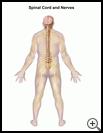
AIDS: Nervous System Problems
________________________________________________________________________
KEY POINTS
- AIDS can cause damage to the nerves, spinal cord, and eyes. It may cause problems with things that you do day to day, and with how you think and make decisions.
- Nervous system problems may be treated with several kinds of medicines.
- Follow the full course of treatment prescribed. Ask your healthcare provider what symptoms or problems you should watch for and what to do if you have them.
________________________________________________________________________
What are nervous system problems caused by AIDS?
AIDS (acquired immunodeficiency syndrome) is caused by infection with the human immunodeficiency virus (HIV). HIV attacks cells of the immune system, nervous system, and other parts of the body. The immune system is the body's defense against infections. The nervous system includes your brain, spinal cord, and nerves. Examples of nervous system problems include:
- Dementia, which is a gradual loss of the ability to think, remember, reason, and plan
- Central nervous system lymphoma, which is a growth of abnormal white blood cells that forms tumors in the brain, spinal cord, and eyes
- Toxoplasmosis, which is a disease caused by a parasite that can be spread by exposure to raw meat or the bowel movements of cats. It can kill patches of tissue in the brain.
- Damage to the nerves and spinal cord
What is the cause?
Cells that are attacked and damaged by HIV stop working right. Other viruses, fungi, bacteria, or parasites may take advantage of your weakened immune system and infect the nervous system. When you have AIDS, infections and tumors are more serious and are harder to treat successfully.
Some AIDS medicines may also affect or damage nerves.
What are the symptoms?
Symptoms depend on the kind of nervous system problem you have. Symptoms may include:
- Memory problems regarding recent events or trouble remembering people, places, times, and dates
- Poor judgment and not being able to understand the results of some actions
- Problems with using your hands or fingers, or doing tasks that require eye-hand coordination that may make it hard for you to do your job
- Being unable to control bowels or bladder
- Being unsteady while walking, or falling
- Having headaches or vision problems
- Having seizures
- Having weakness, numbness, tingling, and burning pain in your arms or legs
How are these problems diagnosed?
Your healthcare provider will ask about your symptoms and medical history and examine you. Tests may include:
- Blood tests
- EEG (electroencephalography), which measures and records the electrical activity in the brain
- CT scan, which uses X-rays and a computer to show detailed pictures of the brain
- MRI, which uses a strong magnetic field and radio waves to show detailed pictures of the brain
- A biopsy, which is the removal of a small sample of tissue for testing
- Lumbar puncture, also called a spinal tap, which uses a needle to get a sample of fluid from the area around your spinal cord
How are they treated?
Medicines used to treat HIV infection may help prevent infections and slow the development of dementia and damaged nerves. Medicines for dementia may help memory loss and confusion. Lymphoma may be treated with chemotherapy and radiation.
How can I take care of myself?
Follow the full course of treatment prescribed by your healthcare provider. Ask your provider:
- How and when you will get your test results
- If there are activities you should avoid and when you can return to your normal activities
- How to take care of yourself at home
- What symptoms or problems you should watch for and what to do if you have them
Make sure you know when you should come back for a checkup. Keep all appointments for provider visits or tests.
You can get more information from:
- AIDSinfo
https://aidsinfo.nih.gov
800--448-0440 - CDC-INFO
800-232-4636

